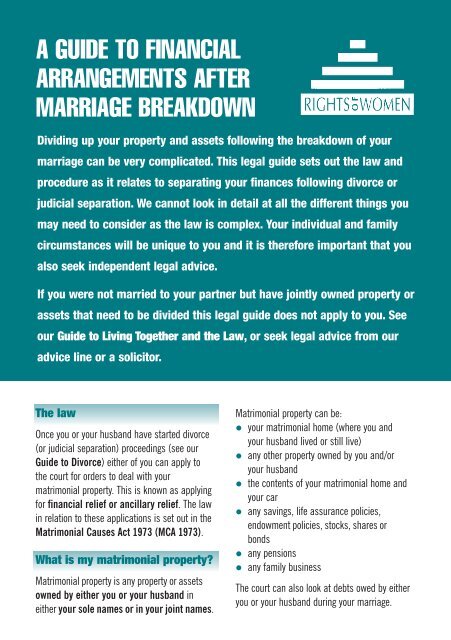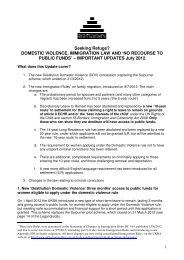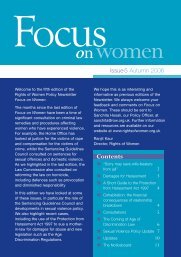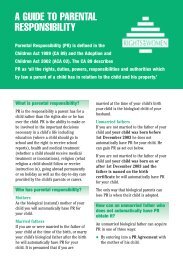Financial Arrangements After Marriage Breakdown - Rights of Women
Financial Arrangements After Marriage Breakdown - Rights of Women
Financial Arrangements After Marriage Breakdown - Rights of Women
You also want an ePaper? Increase the reach of your titles
YUMPU automatically turns print PDFs into web optimized ePapers that Google loves.
A guide to finAnciAl<br />
ArrAngements <strong>After</strong><br />
mArriAge breAkdown<br />
Dividing up your property and assets following the breakdown <strong>of</strong> your<br />
marriage can be very complicated. This legal guide sets out the law and<br />
procedure as it relates to separating your finances following divorce or<br />
judicial separation. We cannot look in detail at all the different things you<br />
may need to consider as the law is complex. Your individual and family<br />
circumstances will be unique to you and it is therefore important that you<br />
also seek independent legal advice.<br />
If you were not married to your partner but have jointly owned property or<br />
assets that need to be divided this legal guide does not apply to you. See<br />
our Guide to Living Together and the Law, or seek legal advice from our<br />
advice line or a solicitor.<br />
The law<br />
Once you or your husband have started divorce<br />
(or judicial separation) proceedings (see our<br />
Guide to Divorce) either <strong>of</strong> you can apply to<br />
the court for orders to deal with your<br />
matrimonial property. This is known as applying<br />
for financial relief or ancillary relief. The law<br />
in relation to these applications is set out in the<br />
Matrimonial Causes Act 1973 (MCA 1973).<br />
What is my matrimonial property?<br />
Matrimonial property is any property or assets<br />
owned by either you or your husband in<br />
either your sole names or in your joint names.<br />
Matrimonial property can be:<br />
l your matrimonial home (where you and<br />
your husband lived or still live)<br />
l any other property owned by you and/or<br />
your husband<br />
l the contents <strong>of</strong> your matrimonial home and<br />
your car<br />
l any savings, life assurance policies,<br />
endowment policies, stocks, shares or<br />
bonds<br />
l any pensions<br />
l any family business<br />
The court can also look at debts owed by either<br />
you or your husband during your marriage.
What orders can the court make?<br />
There are a wide range <strong>of</strong> orders the court can<br />
make to divide your matrimonial property<br />
including:<br />
l transferring property into your name or your<br />
husband’s sole name<br />
l transferring a tenancy into your name or<br />
your husband’s name<br />
l ordering that a property is sold and the<br />
proceeds <strong>of</strong> sale are divided between you<br />
l placing a legal charge over property or other<br />
assets in favour <strong>of</strong> you or your husband<br />
l payment <strong>of</strong> a lump sum to you or your<br />
husband<br />
l future payment <strong>of</strong> a lump sum to you or your<br />
husband from your respective pension funds<br />
l varying your pension or your husband’s<br />
pension so that you or he benefit from it<br />
l ordering you or your husband to pay<br />
maintenance to the other<br />
Maintenance<br />
Sometimes the court will decide that your<br />
husband should pay maintenance to you or in<br />
certain circumstances you may have to pay<br />
maintenance to your husband. These are<br />
usually payments <strong>of</strong> money to be made on a<br />
monthly basis. Maintenance will only be<br />
awarded where appropriate. The court might<br />
decide to make an order for maintenance where<br />
you and your husband have had a long marriage<br />
and he earns significantly more than you or you<br />
are the primary carer <strong>of</strong> young children.<br />
The court can order the payment <strong>of</strong><br />
maintenance for the rest <strong>of</strong> your lives or for a<br />
fixed term or until the person receiving the<br />
maintenance remarries.<br />
Alternatively, the court may decide that there is<br />
enough capital (for example, due to your home<br />
being worth a lot <strong>of</strong> money) for one <strong>of</strong> you to<br />
pay a lump sum or a series <strong>of</strong> lump sums to<br />
the other, instead <strong>of</strong> making regular<br />
maintenance payments. This is called a<br />
capitalised clean break.<br />
Many divorces will be unsuitable for a<br />
maintenance order. For example the court will<br />
not usually award maintenance where you and<br />
your husband earn broadly the same amount <strong>of</strong><br />
money and there are no children.<br />
<strong>Financial</strong> support for children<br />
from a marriage<br />
If, following your separation from your<br />
husband, your children live with you, you will<br />
be entitled to child maintenance to support<br />
your children. The law relating to financial<br />
support for children is in the process <strong>of</strong><br />
change. Child maintenance is currently<br />
calculated and collected by the Child Support<br />
Agency (CSA). It can be agreed between you<br />
and your husband or ordered as part <strong>of</strong> the<br />
financial settlement following divorce. However,<br />
the courts currently have only limited powers<br />
to make orders for child maintenance. For<br />
more information see our Guide to Child<br />
Support or contact our legal advice line.<br />
Clean break<br />
In deciding how to divide your matrimonial<br />
property the court will aim to ensure that you<br />
and your husband’s financial dependence on<br />
each other ends as soon as is possible without<br />
causing hardship to either <strong>of</strong> you. The court will<br />
therefore try to make a clean break order. This<br />
means that once and for all your financial<br />
dependency on your husband will end. A clean<br />
break will not always be possible particularly<br />
where you have children under 18.
What can I do if I am worried that<br />
my husband will dispose (get rid)<br />
<strong>of</strong> our matrimonial property?<br />
If you have issued divorce and financial relief<br />
proceedings and you fear that your husband<br />
may dispose <strong>of</strong> (sell or give away) any assets,<br />
for example, by selling a property or giving away<br />
stocks or shares to a relative or friend, you can<br />
make an emergency application to the court<br />
for an injunction to freeze the assets or prevent<br />
him dealing with them. You can issue an<br />
application for an emergency injunction at the<br />
same time as you issue divorce and financial<br />
relief.<br />
The court also has the power to stop or put<br />
right any disposition <strong>of</strong> assets. The court can<br />
make this type <strong>of</strong> order if you can show that<br />
your husband’s intention to dispose or get rid <strong>of</strong><br />
the assets was to reduce your claim for<br />
financial relief. The court may also need to<br />
consider third party interests in property. For<br />
example if your husband gave his property to<br />
his parents, the court could decide to return the<br />
property to him but they may have to consider<br />
his parents’ financial interest in the property<br />
before making their decision. This is a complex<br />
area so seek legal advice from our legal advice<br />
line or a solicitor.<br />
How do I protect my rights to my<br />
matrimonial home?<br />
If the matrimonial home is in your joint names<br />
you have equal rights as owners and your<br />
husband will not be able to dispose <strong>of</strong> the<br />
property without your consent. However, if your<br />
husband owns the matrimonial home in his sole<br />
name, your right to live in the property will only<br />
continue as long as the marriage. This is<br />
called home rights and is sometimes referred<br />
to as matrimonial home rights. You can protect<br />
your rights so that if your husband tries to sell<br />
the property you will be informed and the sale<br />
will not be able to proceed without your<br />
consent. How you protect your rights will<br />
depend on whether the property is registered<br />
with the Land Registry or not. If you are not sure<br />
whether or not the property is registered you<br />
can contact the Land Registry (see Useful<br />
Contacts) to find out.<br />
If the property is registered at the Land Registry<br />
you should fill in an Application for<br />
registration <strong>of</strong> a notice <strong>of</strong> home rights (form<br />
HR1) and send it to the Land Registry. Your<br />
husband will automatically be informed by the<br />
Land Registry that you have made the<br />
application.<br />
If the property is not registered the procedure is<br />
different. In this case you will need to apply to<br />
the Land Charges Department (see Useful<br />
Contacts) to register a Class F land charge. The<br />
Land Charges Department will not inform your<br />
husband about this.<br />
It is essential that you use the correct procedure<br />
because otherwise your rights will not be<br />
protected. This is a complex area so seek legal<br />
advice from our advice line or a solicitor.<br />
How does the court decide how to<br />
divide our matrimonial property?<br />
When considering how to divide your<br />
matrimonial property the court will consider all<br />
the circumstances <strong>of</strong> your case but firstly the<br />
welfare needs <strong>of</strong> any children <strong>of</strong> the family<br />
who are under 18.<br />
The court will then consider:<br />
l The income, earning capacity, property<br />
and financial resources <strong>of</strong> you and your<br />
husband now and in the future. This can<br />
include property and income, which each
party has or is likely to have in the<br />
foreseeable future and can include your<br />
ability to earn money in the future.<br />
l The financial needs, obligations and<br />
responsibilities <strong>of</strong> you and your husband<br />
now and in the future. Your and your<br />
husband’s needs will be considered in light<br />
<strong>of</strong> the financial resources available to you. In<br />
the majority <strong>of</strong> divorces, needs will centre on<br />
the husband and wife’s needs for housing<br />
and income. Your housing needs will be<br />
assessed by reference to the number <strong>of</strong><br />
bedrooms required in relation to the number<br />
<strong>of</strong> children in the family and the cost <strong>of</strong><br />
properties to buy or rent in your area. Income<br />
needs are calculated by creating lists <strong>of</strong><br />
expenditure setting out income requirements<br />
on either a monthly or an annual basis. Such<br />
schedules must be considered in the context<br />
<strong>of</strong> available income <strong>of</strong> the parties.<br />
l The standard <strong>of</strong> living before the<br />
breakdown <strong>of</strong> your marriage. The<br />
standard <strong>of</strong> living during your marriage<br />
should be assessed by the court and in the<br />
majority <strong>of</strong> divorces the court will be<br />
concentrating on assessing the available<br />
resources and needs <strong>of</strong> you and your<br />
husband and any relevant children. Your<br />
standard <strong>of</strong> living will usually drop following<br />
a divorce, when two separate households<br />
have to be created out <strong>of</strong> one.<br />
l Your ages and the length <strong>of</strong> your<br />
marriage. The age <strong>of</strong> the parties can have a<br />
direct impact on the other factors. For<br />
example, pension considerations will be<br />
significant for a couple in their 50s, but<br />
would be less important if you are in your<br />
30s. The potential income and earning<br />
capacity <strong>of</strong> a woman in her 30s or 40s may<br />
be very important in a divorce, but if you are<br />
in your late 50s or 60s you would probably<br />
not be expected to exercise your earning<br />
capacity.<br />
l Any physical or mental disability that<br />
you or your husband have. If you are<br />
physically disabled and your house has<br />
been modified to facilitate you, your<br />
argument for staying in the property might<br />
be greater.<br />
l Any contributions you and your husband<br />
has or will make, including looking after<br />
the home and caring for children. The<br />
court is likely to treat raising children and<br />
running a household as a contribution to the<br />
marriage equal to that <strong>of</strong> being the main<br />
earner. The court will sometimes take into<br />
account contributions made by one party<br />
before the marriage, for example, where one<br />
party introduced a great deal <strong>of</strong> capital in<br />
the beginning.<br />
l Any behaviour by you or your husband<br />
that the court considers relevant. Bad<br />
behaviour or conduct will only be taken into<br />
consideration if a fair result could not be<br />
achieved if the behaviour was not<br />
considered. In very few cases is conduct<br />
serious enough to be taken into account.<br />
l Any value or benefit to you or your<br />
husband which you would lose when<br />
divorced, for example, a pension benefit.<br />
The court must consider the factors above and<br />
the starting point for any financial split should<br />
be an equal division <strong>of</strong> the assets. However, in<br />
most cases where assets are limited, equality<br />
will not be the appropriate outcome. The<br />
court’s consideration <strong>of</strong> children’s housing<br />
needs will outweigh any issues <strong>of</strong> equality. In a<br />
long marriage, where the assets are greater<br />
than the needs <strong>of</strong> the parties then an equal<br />
division <strong>of</strong> assets is likely to be the appropriate<br />
outcome.
Behaviour and domestic violence<br />
When dividing your joint assets the court only<br />
considers behaviour where it is “inequitable to<br />
disregard it”, this means where it would be<br />
unfair if the court did not consider it. The court<br />
usually only considers behaviour in dividing<br />
your joint finances that directly affects your<br />
financial position. So behaviour such as<br />
attempting to dispose <strong>of</strong> or hide assets may be<br />
taken into account when property is divided<br />
while other behaviour, such as adultery would<br />
not be. However the courts have recently taken<br />
very serious domestic violence into account<br />
where it has affected a woman’s earning<br />
capacity. In a recent case the husband<br />
subjected the wife to a vicious knife attack and<br />
was subsequently convicted <strong>of</strong> rape and the<br />
wife could no longer continue her career as a<br />
police <strong>of</strong>ficer. The court considered it fair in all<br />
the circumstances that the wife should get a<br />
greater share <strong>of</strong> the matrimonial assets<br />
including the entire proceeds <strong>of</strong> sale from the<br />
former matrimonial home.<br />
<strong>Financial</strong> relief procedure<br />
Before applying to court<br />
Before a solicitor can properly advise you on<br />
your entitlement further to a divorce, they will<br />
need to have details <strong>of</strong> both your and your<br />
husband’s financial situation. Both parties to<br />
the divorce must, therefore, provide full and<br />
frank details <strong>of</strong> all their financial resources.<br />
This is called the disclosure process.<br />
This will include details <strong>of</strong> all your matrimonial<br />
property, income and outgoings and is called<br />
financial disclosure. This process can be done<br />
through solicitor’s correspondence or through<br />
the court procedure if your husband is not<br />
cooperating. Once your solicitor has enough<br />
financial information they can begin to advise<br />
you and start to negotiate a settlement with<br />
your husband in the context <strong>of</strong> the court’s<br />
powers (see What orders the court can<br />
make). For example your solicitor might<br />
propose that your husband transfers his legal<br />
interest in the matrimonial home to you.<br />
If you can reach an agreement your solicitor<br />
may draw up a consent order setting out your<br />
agreement which is then signed by you both and<br />
sent to the court for approval by the judge.<br />
You do not need to attend court for this. Once<br />
approved the consent order is legally binding.<br />
If you cannot reach an agreement you may<br />
want to consider attending mediation with your<br />
husband. Mediation is a voluntary process<br />
where you and your husband have face-to-face<br />
discussions with the help <strong>of</strong> a trained mediator<br />
and try to reach an agreement. You should<br />
always seek legal advice on any agreement you<br />
reach as your mediator is not there to give you<br />
legal advice. Any agreement you reach through<br />
mediation can be put into a consent order.<br />
However, mediation will not be appropriate if<br />
you have experienced domestic violence during<br />
your marriage or if there is an imbalance <strong>of</strong><br />
power within the relationship, for example,<br />
because you have a particular disability or<br />
because English is not your first language.<br />
Collaborative family law<br />
Collaborative family law is increasingly being<br />
used to resolve disputes after relationship<br />
breakdown. It involves negotiating with your<br />
husband in a series <strong>of</strong> face-to-face meetings.<br />
Unlike mediation, in collaborative law you attend<br />
these meetings with your lawyer so you and<br />
your husband will be negotiating with each other<br />
with the help <strong>of</strong> your legal representatives, who
must both be trained collaborative lawyers. In<br />
addition, psychologists or counsellors can be<br />
invited to join the meeting to support you<br />
and/or your husband in reaching a financial<br />
agreement. The aim <strong>of</strong> collaborative law is to<br />
assist people in reaching a favourable solution<br />
to their dispute in a fair and transparent way. If<br />
you use collaborative family law, you and your<br />
husband will sign a participation agreement,<br />
an agreement to try to reach a solution without<br />
going to court.<br />
If you are able to reach agreement your<br />
solicitor may draw up a consent order (see<br />
above). If you are unable to reach an<br />
agreement you can still apply for financial<br />
relief in the normal way (see above), but you<br />
will have to consult a different solicitor<br />
because you cannot use the same solicitor<br />
who assisted you in negotiations.<br />
If you have experienced domestic violence<br />
then resolving financial or other matters<br />
though collaborative law will not be<br />
appropriate.<br />
Applying to court<br />
If you are not able to reach an agreement<br />
either you or your husband can make a formal<br />
application for financial relief to the court by<br />
filling in a Form A at a cost <strong>of</strong> £240. If it is<br />
unlikely you will be able to make an<br />
agreement, it can save on solicitor’s costs to<br />
issue a Form A at the beginning <strong>of</strong> the divorce<br />
process, rather than attempting voluntary<br />
disclosure, as the court will set a timetable for<br />
disclosure <strong>of</strong> financial information.<br />
The court will set a date for a First<br />
Appointment. You and your husband will be<br />
ordered to exchange financial information on a<br />
Form E. The Form E is a large standard form<br />
document which must be sworn by you in front<br />
<strong>of</strong> an <strong>of</strong>ficer <strong>of</strong> the court or a solicitor, at a firm<br />
other than your own. The court will set the date<br />
for exchange <strong>of</strong> Form Es. You should send a<br />
copy <strong>of</strong> your sworn Form E to your husband or<br />
his solicitor and the court, by this date which<br />
will be no later than 35 days before the date <strong>of</strong><br />
the First Appointment. If you are representing<br />
yourself there are Form E (<strong>Financial</strong> Statement<br />
in Ancillary Relief Proceedings) Notes for<br />
guidance to help you complete it, available<br />
from your local Family Proceedings or County<br />
Court or from the Court Service website.<br />
If you are not happy with the information<br />
provided by your husband you can ask him<br />
further questions about his finances in a<br />
questionnaire. The questionnaire should be<br />
carefully drafted and must only address issues<br />
relevant to the case, such as gaps in the<br />
financial information your husband has<br />
provided, rather than issues regarding his<br />
conduct.<br />
The first hearing is called the First<br />
Appointment and the purpose <strong>of</strong> this hearing<br />
is to define issues and save on costs. The<br />
judge will decide what questions in your and<br />
your husband’s questionnaires are relevant to<br />
the case, and which questions you and your<br />
husband have to answer. The judge can also<br />
make directions for the instruction <strong>of</strong> expert<br />
witnesses, for example, to instruct a surveyor<br />
to inspect your property. If you are able to<br />
reach an agreement about your finances at<br />
this hearing the judge can make a consent<br />
order.<br />
If further information is needed and/or you<br />
cannot reach an agreement the judge will
arrange a second hearing <strong>Financial</strong> Dispute<br />
Resolution Appointment (FDR). The purpose<br />
<strong>of</strong> the FDR is for the parties to meet at court<br />
and negotiate a settlement. Once at the court<br />
you and your solicitor should work to make an<br />
agreement on the issues between you and<br />
make <strong>of</strong>fers for settlement. The judge will give<br />
an indication <strong>of</strong> how she would divide the<br />
matrimonial property and encourage you to<br />
reach agreement on the basis <strong>of</strong> her proposal.<br />
The judge who sits at the FDR will not hear your<br />
case again. If you are able to reach an<br />
agreement the judge can make a consent order.<br />
You and your husband will be encouraged by<br />
the court to reach a settlement at the FDR<br />
stage, as the costs <strong>of</strong> bringing the case to final<br />
hearing are usually excessive and can outweigh<br />
any potential financial gain you would get at the<br />
final hearing.<br />
If you and your husband are happy with each<br />
other’s disclosure <strong>of</strong> financial information then<br />
you can skip the First Appointment hearing and<br />
have an FDR as the first hearing in the<br />
process.<br />
If you cannot reach an agreement, the judge<br />
will arrange a final hearing at which you and<br />
your husband may have to give evidence in the<br />
witness box. Relatively few cases proceed to<br />
the final hearing stage and it is the only stage<br />
<strong>of</strong> the process where the parties will be<br />
required to give evidence. Having heard the<br />
evidence <strong>of</strong> both parties, the judge will then<br />
make a decision about how your matrimonial<br />
property should be divided. In some situations,<br />
where the judge does not think it is worthwhile<br />
or the parties agree, the proceedings can skip<br />
the FDR stage and go straight from first<br />
appointment to final hearing.<br />
Maintenance while your case<br />
progresses<br />
Once financial proceedings have been issued,<br />
you can apply to the court for maintenance<br />
until a decision is made about how your joint<br />
property is to be divided. If you have been<br />
financially dependant on your husband this is<br />
likely to be awarded. The court can order any<br />
amount that is reasonable. This is sometimes<br />
called an application for maintenance<br />
pending suit. The wealthier party can be<br />
ordered to pay any amount <strong>of</strong> maintenance that<br />
is reasonable to meet the other party’s needs.<br />
This can include an amount to help pay legal<br />
costs. However, maintenance will only be paid<br />
until your joint property is divided and the fact<br />
that you receive maintenance during your case<br />
does not automatically mean that you will<br />
receive it in the long term.<br />
How much will my case cost?<br />
In general the court will not make orders for<br />
costs in ancillary relief proceedings; this means<br />
that each party will pay their own legal costs. It<br />
is impossible for us to give an estimate <strong>of</strong> how<br />
much your case will cost. This will largely<br />
depend on the hourly rate <strong>of</strong> your solicitor and<br />
how long the matter takes to be resolved. You<br />
may, however, be eligible for legal aid and you<br />
should ask a solicitor to do an assessment.<br />
The law relating to this issue can be<br />
complex and we have provided a very basic<br />
overview <strong>of</strong> the terminology, law and court<br />
practice and procedure. We would strongly<br />
advise you to seek legal advice by either<br />
telephoning our legal advice line or a<br />
solicitor.
For free, confidential, legal advice on family law including domestic violence,<br />
divorce and relationship breakdown and issues relating to children call 020<br />
7251 6577 (telephone) or 020 7490 2562 (textphone). The advice line is open<br />
on Tuesday, Wednesday and Thursday 2pm–4pm and 7pm–9pm and Friday<br />
12noon–2pm.<br />
For free, confidential, legal advice on sexual violence, criminal, immigration<br />
and asylum law call 020 7251 8887 (telephone) or 020 7490 2562 (textphone).<br />
The advice line is open on Mondays 11am–1pm and Tuesdays 10am–12 noon.<br />
Useful contacts<br />
Child Support Agency 08457 133 133 www.csa.gov.uk<br />
Collaborative Family Law Group<br />
www.collablaw.org.uk<br />
Community Legal Service 0845 345 4345 www.communitylegaladvice.org.uk<br />
(for finding a solicitor)<br />
Department <strong>of</strong> Work and Pensions<br />
Benefit Enquiry Line 0800 882 200 www.dwp.gov.uk<br />
Her Majesty’s Court Service<br />
www.hmcourts-service.gov.uk<br />
Land Registry<br />
www.landreg.gov.uk<br />
National Domestic Violence Helpline 0808 2000 247 www.womensaid.org.uk<br />
www.nationaldomesticviolencehelpline.org.uk<br />
National Family Mediation 0300 4000 636 www.nfm.org.uk<br />
Gingerbread 0800 018 5026 www.oneparentfamilies.org.uk<br />
Relate 0845 130 40 16 www.relate.org.uk<br />
Resolution 01689 820 272 www.resolution.org.uk<br />
(for finding a family solicitor)<br />
Samaritans 08457 909090 www.samaritans.org.uk<br />
<strong>Rights</strong> <strong>of</strong> <strong>Women</strong>, 52-54 Featherstone Street, London EC1Y 8RT<br />
Office/Admin: 020 7251 6575 Textphone: 020 7490 2562<br />
Fax: 020 7490 5377 Email: info@row.org.uk<br />
Website: www.rights<strong>of</strong>women.org.uk<br />
Industrial and Provident Society No: 23221R<br />
Funded by London Councils<br />
Please note that the law as set out in this legal guide is the law as it stood at the<br />
date <strong>of</strong> publication. The law may have changed since then and accordingly you<br />
are advised to take up to date legal advice. <strong>Rights</strong> <strong>of</strong> <strong>Women</strong> cannot accept<br />
responsibility for any reliance placed on the legal information contained in this<br />
legal guide. This legal guide is designed to give general information only.<br />
© <strong>Rights</strong> <strong>of</strong> <strong>Women</strong> November 2010
















